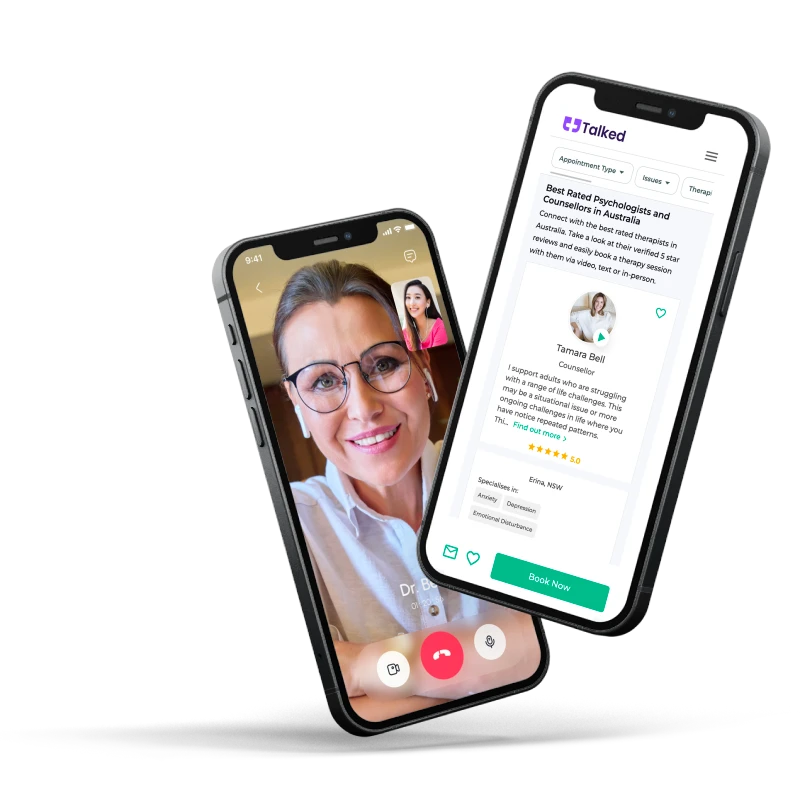Emotional trauma
Childhood trauma
Relationship trauma
Complex PTSD
and more
Free trial sessions
24/7 availability
Qualified therapists
Secure, encrypted sessions
Best trauma and PTSD therapists near you
Psychologist
Psychologist
I am a psychologist with general registration, who houses an array of life and professional experience in counselling and psychology across the lifespan. I am a... More
Psychologist
Psychologist
Hey there! I've been a registered psychologist for 16 years with loads of experience helping adults navigate the ups and downs of life. I'm a big-hearted empath... More
Counsellor
Counsellor
I'm a registered clinical counsellor practising from a person-centred approach, meaning I have great trust in being guided by my clients and their internal wisd... More
Australia's #1
Online Therapy Platform.
How Talked makes trauma and PTSD therapy more accessible
Instant therapist matching

Answer a few questions to get matched with one of our qualified Australian psychologists, counsellors, or psychotherapists.
Connect with your therapist your way

Communicate with your therapist in the way that suits you best - through chat, phone, or video sessions.
Rebates made simple

We process your Medicare claims for you. We also work with many private health insurers and NDIS.

Lower your session costs with Medicare rebates
You may be eligible for 10 rebated sessions per calendar year.
We will process your Medicare claims for you, so you'll be paid directly back in to your bank account.

Qualified support for NDIS participants
Our highly experienced team can help NDIS participants achieve their goals & outcomes.
We have an extensive network of psychologists available and support coordinators can easily book in sessions.
Signs you might need trauma counselling or PTSD therapy
Trauma is deeply personal and often invisible. It can result from one major event or repeated emotional pain over time, such as childhood neglect, abusive relationships, or ongoing stress.
Many Australians live with the effects of trauma for years without realising how much it’s affecting their mental health, relationships, or sense of self. While trauma shows up differently for everyone, there are some common signs that professional support might be helpful.
You feel constantly on edge
If you find it hard to relax, sleep poorly, or are easily startled, your nervous system might be stuck in survival mode. This ongoing hypervigilance can make even ordinary situations feel overwhelming.
You avoid reminders of the past
Avoiding certain people, places, or conversations may feel like self-protection. However, it can also limit your ability to heal. Emotional avoidance is a key sign that trauma is still unresolved.
You struggle with emotional connection
Emotional numbness, feeling disconnected from loved ones, or difficulty trusting others often stems from relationship trauma or emotional neglect. You might want closeness but find it hard to feel safe with others.
You experience intrusive memories or strong physical reactions
Unwanted flashbacks, vivid dreams, or intense reactions to sounds or smells can indicate your body is still processing traumatic experiences, even if your mind tries to forget them.
You feel stuck in guilt, shame or anger
If you find yourself weighed down by guilt, shame, or bursts of anger that feel out of proportion, it could be your body’s way of expressing unprocessed pain.
Recent trauma and PTSD therapist reviews
The best step I could of taken
I felt heard and validated on my first session. Have booked again and looking forward to it
Great!
Easy to use. Clear and upfront. No surprises. Connected to a fabulous therapist.
Amazing platform for therapists!
My experience since joining Talked has been wonderful. All of the traditional client onboarding processes are taken care of. Individual client profiles has made communicating and rebooking hassle free, plus automatic reminders are sent out before sessions (yay!)
This has helped to make things easier.
Throughout the hardships of life and to share it with someone who is listening and being there is helpful.
Fantastic service!
This service is brilliant for accessing therapy at a time that suits you, through a variety of options (video or voice call or messaging). It’s easy to book & the therapist I now use is fantastic.
In control
Love that I can see the reviews and profile of the therapist. I can filter to match my budget but still get a quality service. My first session went really well and I've booked again.
I'm really excited about future therapy sessions
I'm really excited about future therapy sessions with Tamara. She made it so easy to begin this journey. Thank you for being so kind.
Super convenient and hassle free service!
This platform was extremely convenient and straightforward to use. There were a variety of therapists to choose from to suit my needs and the whole process was easy and hassle free.
Excellent service
Booking and payments process was super quick and smooth and I liked that the therapy video session was directly on the platform and they don't force you to download any additional apps. I'll definitely be coming back and would also recommend Talked to everyone else! Great service!
Thank you for this site!
Being able to find a right therapist with this website has been really helpful.
Great platform, makes connecting with the right...
This platform was so easy to use, to search for the therapist, I thought would best suit my needs. I found someone I connect really well...
Very easy and convenient
Talked is very easy to use and really convenient to be able to book therapy sessions when they suit. There are so many therapists to choose from and the profiles make it easy to find the right one. It’s great to be able to send the therapists a message...
A great platform for counsellors and clients
As a Registered Counsellor, I have been finding the Talked platform easy to use. The admin staff are very helpful and quick to respond to questions or problems. It is set up well, with everything in one place: therapist selection, appointment booking, messaging, payments etc. I highly recommend Talked for both counsellors and clients.
Fantastic staff, easy to use platform and easy to book
It's cheaper and better experience then face to face therapy. The staff are well trained, kind and offer a range of different support techniques. Really awesome platform.
How to deal with trauma and PTSD?
Recovering from trauma and post-traumatic stress disorder takes time, support, and the right approach. Whether you’re living with complex PTSD, religious trauma, or have experienced emotional or relational trauma, healing is possible. But it often requires more than self-help.
Work with a trauma-informed therapist
The most effective way to heal from trauma is with the support of a qualified trauma counsellor or PTSD psychologist. These professionals understand how trauma affects the brain, nervous system, and relationships. They can provide therapy tailored to your individual needs and guide you through a safe, structured healing process.
Focus on building safety
Healing begins with emotional and physical safety. This might include setting boundaries, limiting contact with triggering environments, or learning calming strategies that support your nervous system. Safety is not just a goal but is the foundation of recovery.
Allow space to process emotions
Avoiding painful thoughts and feelings is a natural response, but true healing involves working through them with care. A skilled trauma psychologist can help you explore these emotions in a way that feels supportive and manageable.
Stay connected
While it may feel easier to withdraw, support from others plays a valuable role in healing. Friends, support groups, or even trusted community connections can make a meaningful difference alongside trauma counselling. Working with a professional ensures you don’t have to carry the weight of trauma alone.
Related reads about trauma and PTSD
Dec 12, 2025
Roles that adverse childhood experiences play
Oct 23, 2025
How to heal from a nervous breakdown?
What to expect in an online trauma and PTSD therapy session?
A safe and supportive environment
Online sessions are guided by a qualified and compassionate therapist who takes the time to build a sense of trust. You won’t be rushed or pushed to talk about anything before you’re ready. Many people find it easier to open up from the comfort of their own space, with a therapist who listens with care and without judgement.
Evidence-based approaches tailored to you
Your therapist may use trauma-informed care, CBT (Cognitive Behavioural Therapy), EMDR (Eye Movement Desensitisation and Reprocessing), or other well-established methods. These approaches are adapted to suit your experiences and needs, whether you're working through complex trauma, PTSD, religious trauma, or something else. The focus is always on what feels safe, helpful, and manageable for you.
Practical tools and emotional support
Therapy offers more than just talking. You’ll be supported with practical strategies to ease anxiety, manage emotional triggers, and improve your day-to-day wellbeing. These tools are introduced gently and at a pace that works for you.
Talked offers free and unlimited 15-minute consultations so you can find a therapist who feels like the right fit before you begin.
FAQs on trauma and PTSD
Trauma counselling sessions in Australia typically range from $100 to $250 per session, depending on the therapist’s qualifications and experience. Some therapists offer Medicare rebates or sliding scale fees. Check our therapy cost guide for more information.
Trauma refers to a distressing experience that overwhelms your ability to cope, while PTSD is a clinical condition that can develop after trauma. Not everyone who experiences trauma will develop PTSD.
If you feel stuck, anxious, emotionally numb, or keep reliving distressing memories, it may be time to speak with a therapist. You don’t need a formal diagnosis to benefit from support.
Common trauma-informed approaches that trained therapists use include CBT, EMDR, and somatic therapies. Your therapist will recommend what suits your needs best.
Yes, many people find online therapy just as effective, especially when they feel more relaxed in their own environment. The key is working with a therapist you feel safe with.
Yes, specialised therapy can support healing from complex PTSD and religious trauma. Therapists with experience in these areas offer care that is sensitive and tailored.
The length of therapy varies depending on the person and the nature of their trauma. Some may notice changes in a few sessions, while others benefit from longer-term support.







